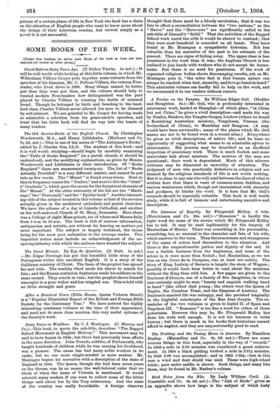Sixty Years in Waifdom. By C. J. Montague. (C. Murray
and Co.)—This book, to quote the sub-title, describes "The Ragged School Movement in English History." This movement may be said to have begun in 1844; but there had previously been efforts in the same direction. John Pounds, cobbler, of Portsmouth, who taught hundreds of children while he was earning his livelihood, was a pioneer. The cause has had many noble workers in its ranks, but no one more single-minded or more zealous. Mr. Montague begins his narrative with a description of the state of England in 1844. The Queen, though she had been seven years on the throne, was by no means the well-beloved rifler that we think of when the name of Victoria is mentioned. It would astonish many readers if one were to collect some of the bitter things said about lure by the Tory aristocracy. And the state of the country was really formidable. A foreign observer thought that there must be a bloody revolution ; that it was too late to effect a reconciliation between the "two nations," as the " Haves " and the " Have-nots " are significantly called in the sub-title of Disraeli's "Sybil." That the activities of the Ragged School work cured the evils it would be absurd to contend ; that they were most beneficial is conceded on all hands. They have found in Mr. Montague a sympathetic historian. Not less valuable than his narrative of the past is his estimate of the present. There are signs of falling away. The upper class is less prominent in the work than it was ; the Anglican Church is less inclined to join hands with workers who do not accept its formu- laries. But there is no need for pessimism. If the work of organised religious bodies shows discouraging results, yet, as Mr. Montague puts it, "the sober fact is that human nature can always be reached when tact, sincerity, and love go hand-in-hand." This admirable volume can hardly fail to help on the work, and we recommend it to our readers without reserve.






















































 Previous page
Previous page